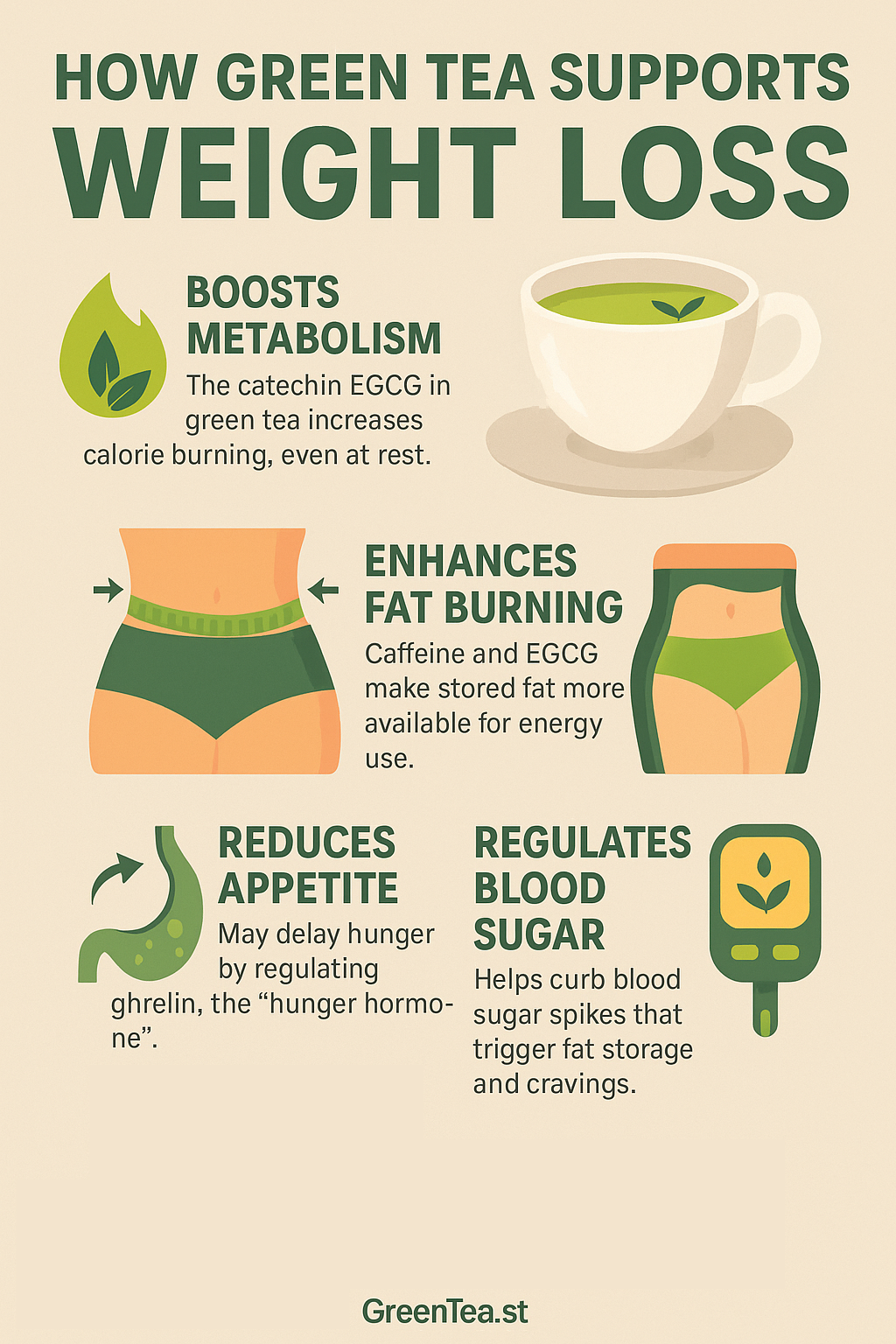Green Tea Benefits for Weight Loss
Are you searching for a natural, science-backed way to boost your weight loss journey? Green tea has long been praised as one of the healthiest drinks on the planet—and for good reason. Beyond its soothing flavor and antioxidant power, research shows that green tea can actively support fat metabolism, enhance calorie burning, and improve overall energy balance.
What makes it unique is its combination of bioactive compounds—especially catechins and caffeine—that work together to improve how the body burns and stores fat. Studies have found that regular green tea consumption may slightly increase calorie expenditure, promote fat oxidation during exercise, and even help regulate appetite and cravings.
In fact, a large meta-analysis published in the International Journal of Obesity found that catechin-rich green tea significantly enhances weight loss and weight maintenance when combined with a healthy diet and regular physical activity (1).
From matcha to sencha, this ancient beverage has become a trusted daily ritual for millions who want a gentle, sustainable way to manage their weight—without relying on harsh supplements or extreme diets.
Nutritional & Active Compounds in Green Tea
The power of green tea lies in its naturally occurring plant compounds, which deliver more than just a light energy boost. Each cup is rich in antioxidants and bioactive nutrients that support fat metabolism, focus, and overall well-being.
Here’s what makes green tea so effective for weight management:
1. Catechins (Especially EGCG)
The main driver behind green tea’s fat-burning potential is a group of antioxidants called catechins, the most potent being Epigallocatechin Gallate (EGCG). EGCG increases the rate at which your body burns fat for energy and has been shown to inhibit enzymes that break down norepinephrine, the hormone that signals fat cells to release fat into the bloodstream. This process helps the body use stored fat as fuel, making green tea a powerful ally in weight loss.
2. Caffeine
Green tea contains moderate levels of caffeine—enough to stimulate metabolism without the crash or overstimulation caused by coffee. Caffeine increases energy expenditure and promotes thermogenesis, which is your body’s process of generating heat and burning calories. When combined with catechins, caffeine’s effect is amplified, resulting in a more efficient fat-burning response.
3. L-Theanine
This amino acid is unique to tea leaves and works alongside caffeine to enhance focus and mental calmness. L-theanine helps counter the jittery side effects of caffeine, resulting in a smooth, sustained energy boost. It also supports mindfulness and relaxation, which can reduce emotional eating triggered by stress.
Together, these three compounds—EGCG, caffeine, and L-theanine—create a metabolic synergy that supports both physical and mental balance.
According to research published in the Journal of Nutritional Biochemistry, green tea catechins have been linked to improved fat oxidation and lipid metabolism, particularly during low-intensity exercise (2).
How Green Tea Supports Weight Loss

Green tea doesn’t melt fat overnight, but it works gradually and effectively by improving how your body burns calories, manages glucose, and uses fat for energy. Let’s look at the main ways it helps promote healthy weight management.
1. Increases Fat Oxidation
The EGCG and caffeine combination in green tea promotes fat oxidation, meaning your body becomes more efficient at breaking down fat molecules for energy. This effect is particularly noticeable during light exercise or fasting states when the body depends more on fat as a fuel source. Studies suggest that green tea extract can boost fat burning by as much as 10–17% during aerobic activity.
2. Boosts Metabolism
Green tea modestly increases resting metabolic rate, which is the number of calories your body burns at rest. This increase can translate into 80–100 extra calories burned daily, a meaningful amount over time. Regular green tea consumption encourages your body to stay in a mild thermogenic state, enhancing calorie expenditure naturally without stimulants or synthetic fat burners.
3. Regulates Appetite
Green tea may help suppress appetite and reduce cravings for sugary snacks. The mild caffeine and catechins can help regulate hunger hormones such as ghrelin, making you feel full longer and reducing the urge to overeat.
4. Improves Insulin Sensitivity
Stable blood sugar levels are essential for maintaining a healthy weight. Green tea has been shown to enhance insulin sensitivity, helping the body better utilize glucose and prevent spikes that can lead to fat storage. This is especially helpful for those managing prediabetes or metabolic syndrome.
A 12-week randomized controlled study published in the American Journal of Clinical Nutrition found that participants who consumed catechin-rich green tea lost significantly more body fat—particularly in the abdominal area—than those who didn’t (3).
Best Times to Drink Green Tea for Weight Loss
Timing plays a key role in maximizing the fat-burning potential of green tea. While you can enjoy it any time of day, certain windows align best with your metabolism and energy needs. Here’s how to make each cup work smarter for you:
1. Early Morning (After Waking Up)
Drinking green tea in the morning helps jumpstart your metabolism and gently awakens your digestive system. It’s a clean alternative to coffee, offering a lighter caffeine lift that boosts alertness without jitters. The catechins also prepare your body to burn stored fat throughout the day.
Tip: Drink it about 30 minutes after waking up on an empty stomach or with a light breakfast for maximum absorption.
2. Before Exercise
A cup of green tea about 45 minutes before your workout can enhance endurance and fat oxidation. The caffeine and EGCG stimulate thermogenesis, helping you use more fat as fuel during your session. It’s particularly effective for cardio or steady-state workouts.
3. Between Meals
Sipping green tea between meals helps control hunger and stabilize blood sugar. It prevents snacking by promoting a mild sense of fullness while also aiding digestion. The antioxidants can help counteract the effects of heavier meals later in the day.
4. Avoid Late Evenings
Because green tea contains caffeine, drinking it too late can interfere with sleep quality. Poor sleep can disrupt metabolism and increase cravings for high-calorie foods the next day. Instead, switch to caffeine-free herbal teas like chamomile or rooibos in the evening.
A study published in the Journal of Nutritional Science and Vitaminology found that drinking green tea before physical activity significantly increased fat oxidation during moderate exercise compared to a placebo group (4).
Best Types of Green Tea for Weight Loss
Not all green teas are created equal. The variety you choose can make a big difference in the concentration of antioxidants, flavor, and overall fat-burning potential. Below are some of the most effective green teas for supporting healthy weight loss.
1. Matcha Green Tea
Matcha is the most concentrated form of green tea because the entire tea leaf is finely ground into powder and consumed. It contains up to three times more EGCG than regular green tea, making it one of the most powerful metabolism boosters. Matcha also provides a smooth, sustained energy lift without the caffeine crash.
Best Way to Drink: Whisk 1 teaspoon of matcha powder with hot (not boiling) water. You can also add almond milk for a creamy, energizing latte.
2. Sencha
Sencha is Japan’s most popular green tea and one of the richest in catechins. It offers a light, grassy flavor and supports digestion while increasing fat oxidation. Drinking Sencha after meals can help manage appetite and improve metabolic balance.
Best Way to Drink: Steep 1 teaspoon of loose leaves in 175°F (80°C) water for 1–2 minutes. Avoid oversteeping to prevent bitterness.
3. Gyokuro
Gyokuro is shade-grown for about three weeks before harvest, increasing chlorophyll and amino acid content. It has a deep umami flavor and high levels of caffeine and L-theanine, creating a calm yet alert feeling that enhances focus and endurance.
Best Way to Drink: Use cooler water (140–150°F / 60–65°C) and a short steep time (90 seconds) to preserve its delicate flavor.
4. Hojicha
Hojicha is roasted green tea with a nutty, toasty flavor. It contains less caffeine than most green teas, making it perfect for those sensitive to stimulants. Though lower in catechins, it still aids digestion and can be enjoyed later in the day.
Best Way to Drink: Steep at 195°F (90°C) for about 2–3 minutes.
5. Genmaicha
A mix of green tea and roasted brown rice, Genmaicha offers a mild, earthy taste and a gentle energy boost. It’s not as high in EGCG as matcha, but it helps with digestion and keeps you satisfied longer—useful for controlling snacking.
Best Way to Drink: Brew at 180°F (82°C) for 2–3 minutes for a light, nutty infusion.
According to a review in Molecules Journal, different green tea cultivars vary in EGCG content, with matcha ranking highest due to the consumption of the whole leaf (5).
Potential Side Effects and Precautions
While green tea is one of the healthiest beverages you can drink, moderation matters—especially when your goal is weight loss. Too much can lead to unwanted effects tied to caffeine and tannins. Here’s what to keep in mind:
1. Caffeine Sensitivity
Green tea contains about 30–50 mg of caffeine per cup, depending on the type and brew time. This is less than coffee, but drinking multiple cups can add up. Excess caffeine may cause restlessness, increased heart rate, or sleep disruption—particularly if consumed late in the day.
Tip: If you’re sensitive to caffeine, try low-caffeine varieties like Hojicha or switch to decaffeinated green tea in the afternoon.
2. Iron Absorption Issues
The tannins in green tea can inhibit the absorption of non-heme iron (the kind found in plant-based foods). To minimize this effect, avoid drinking green tea with meals rich in iron—especially for those with anemia or iron deficiency.
Tip: Drink your tea between meals rather than during them.
3. Stomach Irritation
When consumed on an empty stomach, green tea’s natural acidity may lead to nausea or stomach discomfort for some people. It’s best enjoyed after a light snack or meal to buffer the effects.
4. Interactions with Medications
Green tea can interact with certain medications, including beta-blockers and anticoagulants, due to its caffeine and vitamin K content. Always consult your doctor if you’re on medication or have chronic health conditions.
A safety review published in the European Journal of Clinical Nutrition emphasizes that green tea is safe for most adults when limited to 3–4 cups per day (6).
FAQs About Green Tea and Weight Loss
Most studies suggest 2–4 cups daily for noticeable benefits. This provides a steady amount of catechins and caffeine to promote fat metabolism without overconsumption.
You can, but it may cause mild stomach discomfort for some. It’s best to have it after breakfast or a light snack.
Sencha and matcha are both great starting points. Sencha offers a refreshing flavor, while matcha provides a richer, creamy taste and stronger effects.
No. Green tea supports fat burning and metabolism but works best when paired with physical activity and a balanced diet.
Yes, but use natural options like honey, stevia, or monk fruit to avoid counteracting its calorie-burning benefits.
Yes, but hot tea may slightly enhance thermogenesis. Cold-brewed green tea is gentler and retains antioxidants well, making it ideal for summer or sensitive stomachs.
Conclusion
Green tea is one of nature’s most effective and gentle weight-loss allies. Thanks to its catechins (particularly EGCG), it helps boost metabolism, burn fat, and improve energy levels naturally. Whether you prefer matcha in the morning or Sencha after meals, consistency is key.
When paired with a healthy diet, hydration, and daily movement, green tea can accelerate fat oxidation and improve overall wellness. Just remember that moderation is essential—3–4 cups a day are plenty to harness its benefits without side effects.
Green tea doesn’t just help you lose weight; it encourages mindfulness, hydration, and balance—making it a long-term ally for a healthier lifestyle.


